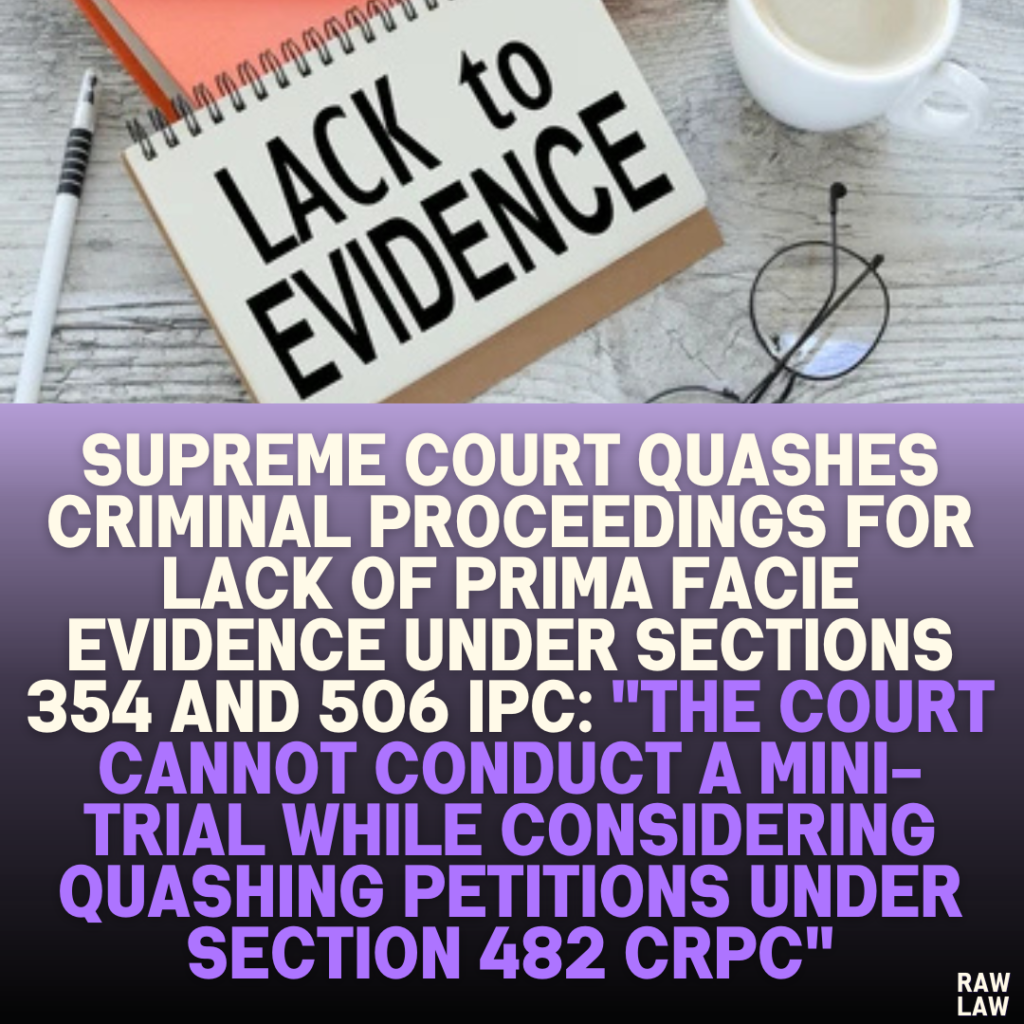Court’s Decision:
The Supreme Court quashed the criminal proceedings against the appellant (A-2), initiated under Sections 354 (assault or criminal force to outrage modesty) and 506 (criminal intimidation) of the Indian Penal Code (IPC). The Court emphasized that it could not act as a trial court in deciding petitions under Section 482 CrPC, and must only examine whether the allegations disclose a prima facie offence. It held that the materials presented were insufficient to justify the continuation of proceedings against the appellant.
Facts:
- Joint Business Relationship:
The appellant and the complainant were directors of a joint company, “M/s LAJ-IDS Exports Pvt. Ltd.,” with a shareholding ratio of 75:25. - Business Disputes:
Financial disagreements and management issues between the directors escalated into personal allegations, which led to criminal complaints. - Complaint Allegations:
The complainant accused the appellant’s brother (A-1) of inappropriate behavior, including touching her inappropriately and attempting to outrage her modesty. She further alleged that the appellant harassed her mentally and verbally when she sought to report the incidents. - FIR and Chargesheet:
An FIR was registered under Sections 354 and 506 IPC following directions by the Magistrate under Section 156(3) CrPC. The subsequent chargesheet alleged harassment and threats by the appellant and his brother. - Appellant’s Petition for Quashing:
The appellant filed a petition under Section 482 CrPC to quash the FIR and the proceedings, arguing that no prima facie offence was made out against him.
Issues:
- Did the allegations in the FIR and the chargesheet meet the statutory requirements for initiating criminal proceedings?
- Was the High Court correct in refusing to quash the proceedings under Section 482 CrPC?
Petitioner’s (Appellant’s) Arguments:
- No Prima Facie Offence:
The allegations lacked specific details or evidence connecting the appellant to any criminal acts under Sections 354 or 506 IPC. - Malicious Complaint:
The dispute was primarily a business disagreement, and the complainant had maliciously converted it into a criminal matter. - Preliminary Report Findings:
A preliminary investigation found no evidence of the alleged offences. - Chargesheet Deficiencies:
The chargesheet contained vague assertions, with no concrete evidence against the appellant.
Respondent’s (Complainant’s) Arguments:
- Clear Allegations of Harassment:
The complainant claimed that the appellant used abusive language and harassed her, while his brother attempted to outrage her modesty. - Supporting Statements:
Statements recorded under Sections 161 and 164 CrPC corroborated the allegations. - Prima Facie Case Exists:
Citing legal precedents, the complainant argued that the FIR and statements disclosed offences that justified continuation of the proceedings.
Analysis of the Law:
- Scope of Section 482 CrPC:
The Court reiterated that quashing proceedings is warranted only when:- The allegations do not constitute any offence on their face.
- Proceedings are manifestly malicious or an abuse of the court’s process.
- Essentials of Sections 354 and 506 IPC:
- For Section 354 IPC, there must be evidence of criminal force applied with intent to outrage a woman’s modesty.
- For Section 506 IPC, there must be a clear intention to cause alarm through threats.
Precedent Analysis:
- Rupan Deol Bajaj v. K.P.S. Gill:
Defined “modesty” and clarified the requirements for invoking Section 354 IPC. - Manik Taneja v. State of Karnataka:
Explained that for criminal intimidation under Section 506 IPC, the intent to cause alarm must be clearly established. - State of Haryana v. Bhajan Lal:
Highlighted situations where criminal proceedings can be quashed to prevent abuse of process.
Court’s Reasoning:
- Insufficient Evidence for Section 354 IPC:
- The Court found no evidence of physical force or intent to outrage modesty. The allegations were vague and unsupported by tangible proof like CCTV footage or eyewitness accounts.
- No Mens Rea for Section 506 IPC:
- The Court observed that the material lacked any indication of intentional threats made by the appellant to cause alarm.
- Admissibility of Statements:
- Statements under Sections 161 and 164 CrPC are inadmissible as primary evidence and cannot substantiate the charges at this stage.
- Business Dispute Mischaracterized:
- The Court noted that the allegations appeared to stem from business disagreements rather than criminal conduct.
Conclusion:
The Supreme Court set aside the High Court’s order and quashed the criminal proceedings against the appellant. It clarified that its observations were limited to the appellant and did not affect proceedings against his co-accused.
Implications:
- Protection from Malicious Prosecution:
The judgment reinforces the principle that criminal law should not be used as a tool for settling personal or business disputes. - Guidelines for Quashing Petitions:
The ruling emphasizes that courts must focus on whether the allegations meet the statutory threshold without delving into the merits. - Safeguard Against Abuse:
The decision serves as a safeguard against frivolous criminal complaints filed with ulterior motives.



